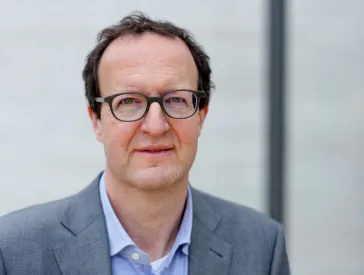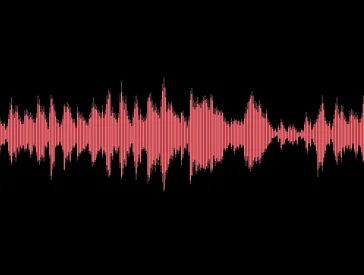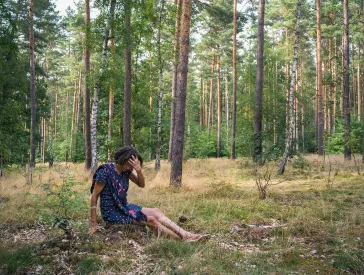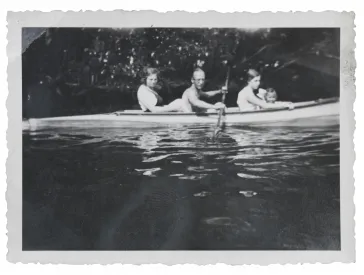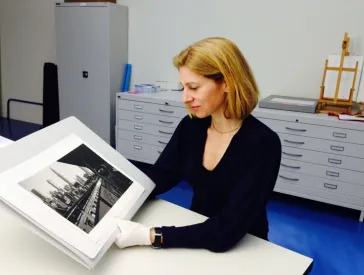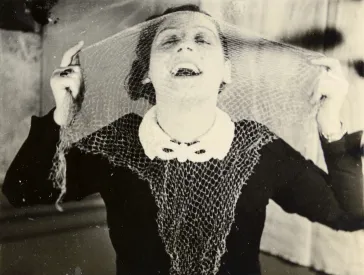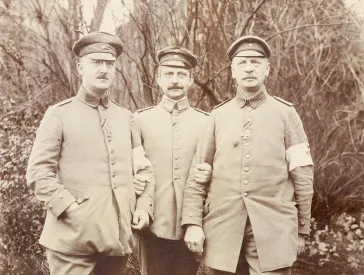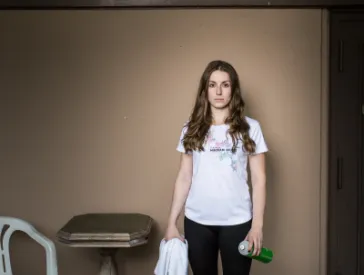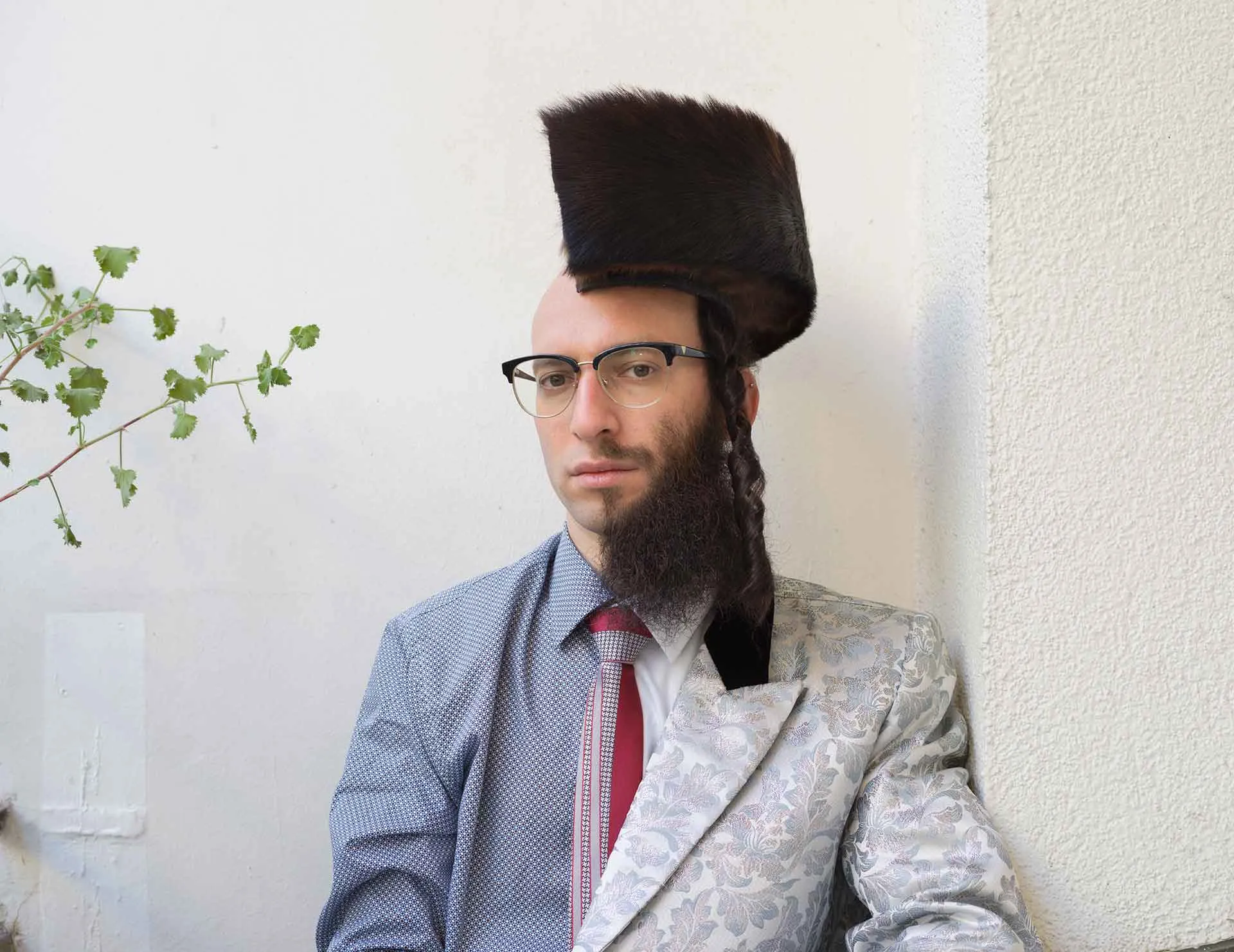
Frédéric Brenner, Zerheilt #42, Berlin, 2018; Jewish Museum Berlin, purchased with the support of the FRIENDS of the Jewish Museum Berlin
Photographic Collection
This area of the collection contains extensive holdings from the early days of photography to the present. It includes individual collections, thematic and personal compilations, and works by well-known photographers. Many of the photographs come from family collections with strong biographical connections.
Main Subjects
Well-represented topics include the German-Jewish middle class during the German Empire and the Weimar Republic; the First World War; company and economic history; Jewish sport, Jewish student associations, schools and other Jewish institutions; Hakhshara camps focused on preparing for emigration to Palestine; emigration; life in exile; the new start post-1945; and Jewish life in the FRG, the GDR and reunified Germany.
What is Hakhshara?
Hakhshara (Hebrew for preparation, making fit), agricultural training centers for Jews’ systematic preparation for settling in Palestine, especially in the 1920s and 1930s
Important Holdings
Photographic works by Herbert Sonnenfeld, Ruth Jacobi and Roman Vishniac are among the most extensive and important individual portfolios. Small collections from notable photographers of the 1920s and 1930s, such as Lotte Jacobi, El Lissitzky, Ilse Bing and others, are also held. A notable addition in recent years is a series of 13 photographs by Helmar Lerski from his 1935–36 series Metamorphosis through Light, taken in Tel Aviv.
Later works, such as Leonard Freed’s German Jews Today from the 1960s, and numerous photographs by Daniel Josefsohn from Israel and Germany, are also represented.
Helmar Lerski, Metamorphosis 591: Transformation through Light, Tel Aviv, 1935–1936; Jewish Museum Berlin
Who is Herbert Sonnenfeld?
Herbert Sonnenfeld (1906–1972), one of the few Jewish photographers to document Jewish life in and around Berlin in the 1930s, in 1939 emigration to New York
Who is Leonard Freed?
Leonard Freed (1929–2006), photographer, from 1972 full member of the prestigious Magnum agency, known for his long-term documentary projects, several series on Jewish themes
Museum Projects
Our own photography projects have also found their way into the collection. Examples include a portrait series of Jewish athletes taken for the 14th European Maccabi Games, which took place in Berlin in the summer of 2015, and portraits of participants from the Object Days project, which shows people with personal objects related to migration.
Exhibition projects have also played a key role in expanding the collection, including numerous photographs by Michael Kerstgens on the immigration of Jews from the former Soviet Union, an extensive collection of Fred Stein’s work in Paris and New York, and the series Zerheilt: Healed to Pieces, by Frédéric Brenner, featuring portraits of places and people in Berlin between 2016 and 2019.
How can I conduct research using the museum’s archive, collections, and library?
Our Reading Room is open to the public. You can also research using our library’s holdings and some of our collection’s holdings online. To view additional holdings, please contact the responsible curators.
How can I donate objects, photographs, and documents to the museum?
Do you own materials related to Jewish culture and history in Germany that could be of interest to us? We would be delighted to hear from you!
I would like to depict or borrow an object from your collections. Who should I contact?
Your contacts for photo permissions are Valeska Wolfgram and Birgit Maurer-Porat (T +49 (0)30 259 93 433, email: fotodoku@jmberlin.de). Please note that the processing time for requests can take between 4 and 6 weeks.
Loan requests must always be made nine months before the beginning of the exhibition. Requests must be made in writing to the director (Hetty Berg, Stiftung Jüdisches Museum Berlin, Lindenstr. 9-14, 10969 Berlin).
Contact
Theresia Ziehe
Curator of Photography
T +49 (0)30 259 93 561
F +49 (0)30 259 93 409
t.ziehe@jmberlin.de
- Address
Jewish Museum Berlin
Lindenstraße 9–14
10969 Berlin
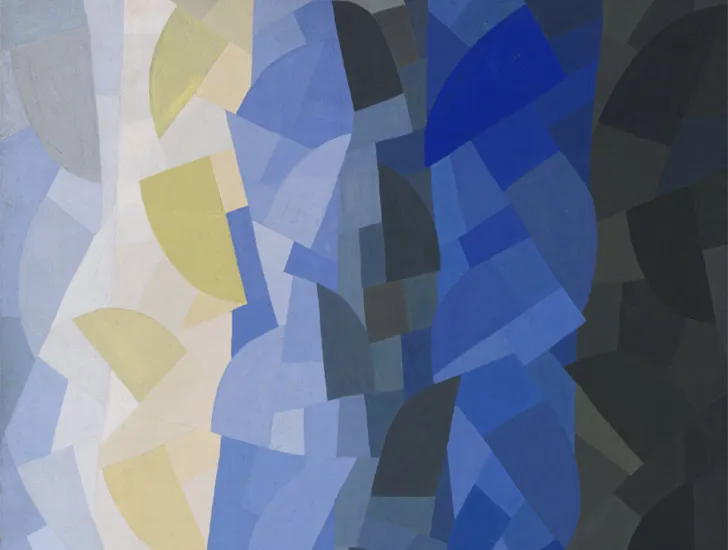
Our Collection
An overview
- The objects we collect: information & FAQ
- Search our collection: a growing number of items from our digitized collection are available to view and search online (in German)
Details
- Archive: documenting Jewish life
- Audiovisual Media: historic sound recordings, family films and video art
- Library: books and more about Jewish art, culture, and history
- Fine Arts: visual culture of German-Jewish history and the present day
- Current page: Photography: from the beginnings of photography to the present day
- The Jewish Object: Material Culture: objects and textiles for nonreligious purposes
- The Jewish Object: Applied Arts: objects produced by German-Jewish craftspeople and companies
- The Jewish Object: Judaica: ritual and everyday items for religious purposes
Digital Content
- Online Showcase: digital presentation of our collection holdings, video projects, and more
- Object in Showcase: stories from our collection
See also
- The History of Our Collection: learn about the initial inspiration and transition to today's museum
- Our Collection Management: Protection, preservation, and documentation
- Sources of Collection Holdings: in publications of the Berlin museum (1978 to 1995)
- Provenance Research: unveiling the origins of our objects
- Conservation: how to presperve our objects for future generations
